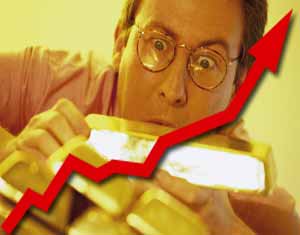11.06.2008
June 05, 2008 (the date of publication in Russian)
Victor Usiyevich
PARADOXES OF RUSSIAN INFLATION. Part 2
Striving for budget surplus stimulates permanent prices growth
Part 1: http://www.rpmonitor.ru/en/en/detail.php?ID=9769
 THE CONSUMER PAYS FOR ALL
THE CONSUMER PAYS FOR ALL
During April and May, wholesale prices for meat, produced by Russian companies, zoomed by 10-30% in various regions of Russia, while beef and pork livestock grew by 20%. This hike is boosted with the increase of fuel prices. As a result, the domestic food production that is logically supposed to grow does not develop to the extent necessary to satisfy the domestic demand. In the recent years, production of beef and pork is increasing by only 8 per cent per year.
On this background, the Consumption Supervision Authority introduces a ban on import of meat from 18 major European producers. This administrative intervention, not supported by any other levers of stimulation of domestic production, is going only to contribute in the price hike. In June, prices for meat are going to increase by 15-25%.
The increase of price for fuel and electricity simultaneously affects the sphere of communal services. Most of the consumers could save on communal tariffs by installing utility meters. But these devices are also too expensive. Being unable to afford their use, millions of people overpay to local communal services. These additional incomes could be spent for renovation of the outdated and exhausted systems of heating, water supply and sanitation. Instead, regional administrative offices are using them for information systems, allegedly requiring 500 million rubles for a region with a 2 million population, plus 100 million rubles for "implementation of a pilot project". Much more is spent by the same region in the Volga area for "exchange programs", suggesting "sharing experience in saving budget resources" (sic) with European colleagues. Only the travel to the European state, supposedly comparable with Russia in housing management, is estimated in $8000 per a bureaucrat.
Initiating a new anti-corruption effort, federal powers could focus at a novel kind of corruption, when a state official, managing a state-dominated fuel corporation, pays a bribe to another state official, responsible for distribution of budget resources, for the access to budget programs.
THE USELESS SACRED COW
There is one more factor that significantly influences Russian economy: the surplus of federal budget, regarded as a "sacred cow" by the Government.
For the purpose of guaranteeing the surplus, the federal powers first subtract more money than necessary for budget expenses, and thus boost inflation by speeding up prices for goods and services, to which producers add potential taxes. Afterwards, realizing that new prices are not affordable for consumers, the Government tries to compensate their expenses by raising salaries for budget-paid officials, as well as pensions. These efforts, especially in the aftermath of monetization of privileges for pensioners, only increase money supply and thus contribute to inflation.
On May 27, the government reported that the budget incomes are going to increase by 1 trillion rubles. From this additional trillion, only 120 million is supposed to be spent, as larger amount expenses are likely to accelerate inflation.
In fact, according to Vedomosti daily newspaper, the supposed expenses comprised in 232 billion rubles, but the ministries were instructed to postpone implementation of a number of programs, estimated in 112 billion rubles, for the next year. In particular, these postponed expenses include several programs of the Government's Investment Fund. In addition, the Federal Pension Fund is going to save 26 billion, referring to increase of salaries.
Meanwhile, the largest item of expenditure is the Olympic Games in Sochi, for which the federal budget is going to spend 50 billion rubles. It is noteworthy that over 14 billion rubles are to be paid to citizens who have successfully sued state institutions.
However, the state is also going to increase expenses for agroindustry and social programs, while several Investment Fund programs are destined for new road infrastructure. Generally, the Government considers – as well as in the previous year – a higher increase of expenses than the increase of GDP. It is noteworthy that from the planned additional budget incomes of 1.8 trillion, 448 billion are to be provided by "non-fuel" sectors of economy – which means, again, additional taxing for the weaker sectors of domestic production.
Why then not amend the taxing system in a way diminishing the burden on the non-fuel sectors of production? In this way, the increase of prices, as well as inflation, could be reduced, thus making the extra social injections unnecessary. Who would lose from this change, except the notorious sacred cow of budget surplus?
Number of shows: 1112
 ENG
ENG 

 ENG
ENG 
